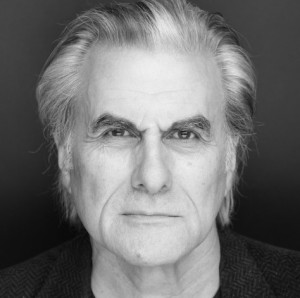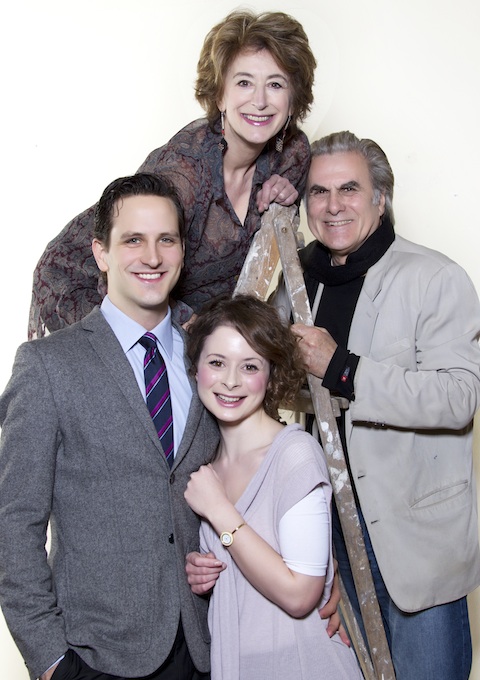- Sunday, June 22, 2025
- Stay Connected
 Abraham Lincoln
If given the truth, the people can be depended upon to meet any national crisis...
Abraham Lincoln
If given the truth, the people can be depended upon to meet any national crisis...
 Guildford news...
for Guildford people, brought to you by Guildford reporters - Guildford's own news service
Guildford news...
for Guildford people, brought to you by Guildford reporters - Guildford's own news service
Stage Dragon Interview: Oliver Cotton
Published on: 26 Mar, 2012
Updated on: 27 Mar, 2012
Oliver Cotton is about to appear in ‘Barefoot in the Park’ at the Yvonne Arnaud. Here he talks about the play, his nerves, acting with the greats such as Olivier and Gielgud and… his hidden talent…
Stage Dragon: What should we expect from this Neil Simon play?
Oliver: Well, it was written in the 60’s, in ’63, and it was done on Broadway. Jane Fonda and Robert Redford made the film later on. And it’s a very sweet comedy, about a young, married couple, trying to acclimatise to married life. “What should you expect?” It’s very funny.
Stage Dragon: Have you worked with Maureen Lipman before?
Oliver: No, we’ve never worked together before. I’ve always admired her from afar. (sudden revelation) Oh! Well, we’ve been in the same TV programme [Sensitive Skin], but we’ve never had scenes together.
Stage Dragon: What is your favourite line from the play?
Oliver: Oh, my God! That’s really hard; I mean, there are so many. If I quote it now, I’m going to get it wrong!
Stage Dragon: Have you ever had your own “barefoot in the park” moment of spontaneous, carefree behaviour?
Oliver: I think I’ve had lots of them, yeah! I think everybody does. Everybody has moments when they suddenly feel that they’re released or they’re free from the shackles of everyday life. I mean, “barefoot in the park” is a kind of metaphor, if you like, for actually letting go – actually letting go of the convention of the ties that hold you, and actually finding some freedom, outside your own constraints.
Stage Dragon: Do you still get first-night nerves?
Oliver: Yes…and second night nerves, and third night nerves…and a hundred night nerves!
Stage Dragon: Do you think it’s a good thing?
Oliver: I don’t know if it’s a good thing or a bad thing. It’s a good thing, so long as nerves don’t destroy you. I mean, walking onto a stage is a very adrenalised experience, and there’s many, many, many, many, many things to remember, when you do a play. And you’re working on many levels at once. It’s not nerves like you’re shaking, just nerves because you’re hyped. It’s rather precise, especially in a comedy – it’s a very precise business… I do get nerves, but I’m not destroyed by them.
Stage Dragon: What’s been your most terrifying onstage moment?
Oliver: …Probably, the first night of a play I did called Children of a Lesser God, in the West End, where I had to learn American Sign Language. The young girl, who I was playing opposite, was profoundly deaf, she didn’t speak; so I spoke to her in American Sign Language at the same time, and it went on for two-and-a-half hours. I had to learn the sign language before I did it, and it was her language. So that was very terrifying, truly frightening – so frightening I lost five pounds in weight, on the first night!
Stage Dragon: Do you employ a similar preparation for each role you play?
Oliver: I suppose so, yes. It’s always the same tortuous process of trying to find a way through. Except, it’ll be variations because, depending on the role, it’ll be different things you have to do; if you’re playing a boxer, you have to go and learn how to box. But if you’re playing something that doesn’t need actual outside skills, then those parts you prepare in more-or-less the same way.
Stage Dragon: I think I’m right in saying that you’ve worked with both Gielgud and Olivier…?
Oliver: And Richardson, yeah.
Stage Dragon: How did they compare?
Oliver: I worked with Olivier when I was very, very young. It was almost my first job. I was very inexperienced and completely awestruck by him. It was a bit like working with God; at that time especially, when he was running the National Theatre. I was at the National Theatre for two years, under his leadership. He was like a huge animal presence. Gielgud was quite, quite different – very lyrical, not a physical actor at all, actually extraordinarily emotional. He could be unbelievably touching, in a way. But I learnt an enormous amount from working with them both.
I worked with Gielgud more than I worked with Olivier. I used to watch Olivier from the wings. I was in a couple of productions with him, but in such a minor role, that it was much more about watching him. Olivier was a great magician. He loved dressing up, he loved make-ups, he loved funny voices – he loved the whole thing. Gielgud was never interested in all that, you know? If you look at the film of Richard III, with Olivier – it’s rather old-fashioned now, of course – but, nevertheless, his performance is kind of definitive in that role. People still try not to be like Laurence Olivier, when they play Richard III. But Gielgud’s in that, playing Clarence. If you look at the two of them – their types of actor – one sees very clearly the difference.
And then I was also in a play with Richardson, and with Schofield as well, who was fantastic. Paul Schofield, he was a wonderful actor.
Stage Dragon: Is there an actor dead or alive that you would love to work with, on a dream project?
Oliver: Oh, gosh…these questions! I worked with Brando, and I worked with George C. Scott, both of whom I admired enormously as actors – so that was extraordinary. There are a lot of American actors who I’d really love to work with. I would like to work with Robert De Niro.
Stage Dragon: How important is provincial theatre, and the Yvonne Arnaud’s place in it?
Oliver:Well, I think that provincial theatre’s fantastically important, and it’s rather fighting for its life at the moment. But then, what’s new? There’s always cuts in the arts. We just don’t spend the money on the arts as Europe does. I’ve just come back from France, actually, doing a concert. I mean, the money that was available to this concert…it’s quite…It’s rather shaming, the lack of money in this country. Provincial theatre is incredibly important. Most of my colleagues, and myself, are spending a great deal of time now in the provinces. Sheffield: there’s wonderful work being done at the West Yorkshire Playhouse. Up in Perth, there’s a marvellous girl called Rachel O’ Riordan – brilliant director. All these places are doing as good work as is done in London. I mean, it is very, very fine work all over the country. It should be funded much more than it is. A lot of places are closing now. Guildford is a wonderful theatre that’s got a fantastic tradition. I don’t know what its funding situation is…
Stage Dragon: It lost its grant.
Oliver: That’s terrible. Well, there you are: why should Guildford lose its grant? It’s a disgrace. It’s a disgrace that theatres have to go around with a hat out, trying to beg for money; but that’s an ongoing debate – it’s gone on for as long as I can remember. Olivier was going round with a hat. Peter Hall was going round with a hat, at the National Theatre. I mean, Kevin Spacey has done wonders at the Old Vic with private funding. It’s brilliant, what he’s done; they get no grants at all. It’s just the ongoing story of the arts in England. We have incredible arts in this country, and it’s just not funded as it should be. There’s always a struggle for money, and I don’t know why successive governments won’t put the funding in.
Stage Dragon: Outside the realms of performance, do you have a secret talent?
Oliver: (Laughs) Oh, gosh! (sudden revelation) Oh! Well, I play the classical guitar… I have a complete passion for music. And I write; I had a play on in London last year. I have a writing partner; we write together for television. I also have a huge interest in medicine. I can’t say it’s a talent, because you can’t have a talent for medicine, can you? You can either do it or you can’t! …I always wanted to be a doctor, but I ended up on the stage.
Stage Dragon: Thank you Oliver. Good luck!














Recent Comments